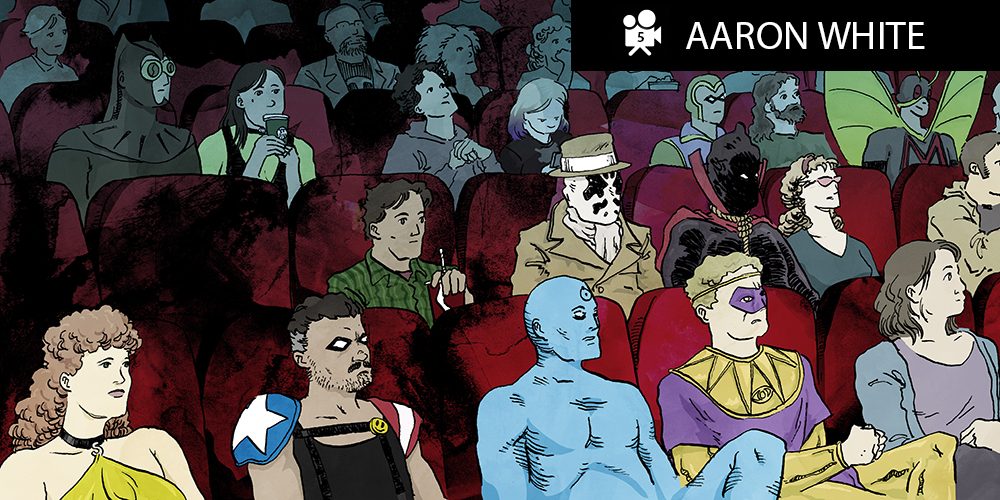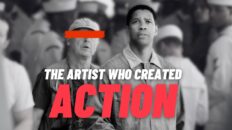RUD: Thank you for joining us! Tell us a little about your background. What drew you into film criticism? How did you find yourself doing this?
White: I’ve always had an interest in film and arts in general. But I have a very finicky personality. I would get into one hobby and go full bore into that, whether it was music or movies or video games. I would just pour myself into it and then I would burn out. And then I would switch to a new hobby and do the same thing over and over again. Over the course of, I would say, my 20s, film criticism or movie review blogging was one of those many hobbies. I did a couple of different stints online trying to write reviews. Once I even started my own website. I called it the Critique Geek–I still like that name, by the way. And I tried my hand at some YouTube video reviews. This was before production values were going through the roof, so it was just my face. Now days, that doesn’t cut it. You need graphics and all kind of green screen and lighting effects going on to make things compelling. I tried things for a few years and my biggest problem was consistency. It’s a problem I’ve had my entire life–consistency–just trying to do something repetitively. I would usually flame out.
Then I discovered podcasts in, probably, 2012 or 2013. Primarily Filmspotting, one of the biggest film podcasts at the time. Probably still one of the biggest film podcasts out there. I had a long commute, so Josh Larson and Adam Kempenaar would get me through the drive. I would listen to their episodes and I found myself talking back to them. I would have a conversation with them even though they couldn’t hear me. They have no idea that we’ve done this. So don’t tell them.
It was a lot of fun and it helped me realize all of the things they weren’t saying that I wish someone was saying. That branched out into more podcast discovery and bugging my best friend back home in Arkansas, where I’m from, about how I wish we could have more conversations about movies. From there, I think in early 2016, we decided to use a voice texting app to start having conversations about Battlestar Galactica. We would watch one episode and then we would voice text our thoughts to each other and have a conversation about it and then go on to the next episode. Through the course of that we realized how much more we were gleaning from it because he would pick up on things that I wouldn’t pick up on and I would have different perspectives from him. We enjoyed it and then Batman v Superman: Dawn of Justice came out–that was the real catalyst. What happened was, I came back from seeing it and I was blown away, I was a big fan. And I remember calling Patrick and saying, “Listen, this movie is amazing and I hate that it’s getting awful film criticism. Nobody out there is liking it in the criticism world. I hate that. Why is nobody out there praising movies even if they’re not winning Oscars?” And on a whim, he said, “Let’s give it a shot. Let’s record some thoughts on it and see what happens.” And that was it. We sat down and got on Skype and recorded us talking about Batman v Superman: Dawn of Justice and that led into the creation of the podcast.
RUD: You bring up Filmspotting. In my interviews so far with both professional and amateur film critics, Filmspotting has been noted almost universally. What do you think makes that Podcast special? What do you think is worth emulating and what do you draw from that and try to build on?
White: In podcasting you have to have chemistry. So many podcasts I’ve listened to, the two hosts do not have a natural fit in a way that is pleasant to listen to. Filmspotting has that. Part of this, I think, is that they are sitting in the same room, right beside each other. They go to the movies together. They walk over to their studio and they record. But you can feel that energy that they have together. So right off the bat, it’s like being in the room with them. But what makes them really special is that they are very knowledgeable about film. They are what I would consider true film critics. They have an understanding of the history of film, they have different personal beliefs and backgrounds that they bring into their conversations, they are able to evaluate film from a perspective of what I would say is close to objectivity, and they can critique its technical merits aside from their personal response to a film. But they’re not afraid of admitting their personal response. So they just have a really good balance. A lot of people enjoy spoiler free movie reviews, and they do that. You can listen to their conversation and very easily determine if a movie is going to be for you.
RUD: What do you feel like you specifically bring to film criticism that isn’t out there? I was talking to a few critics recently who were lamenting the passing of Roger Ebert. I miss his voice, but I like to point out that there are so many people writing great criticism. What do you bring to the conversation?
White: We definitely miss Ebert as well. Largely because if we were going to say Feelin’ Film is emulating any critic in particular, it would be Ebert. He’s probably the closest analogue to the way we like to look at movies. The approach that we take is to put more weight on our emotional response to the movie than whether or not it succeeds in technical quality. The way I would separate that is by saying most film criticism looks at the acting–is it done well? are the action scenes filmed in a coherent manner? is the cinematography, is the editing done well? For us, and for myself, I’m more interested in “Does the movie convey the message it is trying to convey? Does it evoke the emotional response it’s trying to evoke?” So if the movie is trying to make me feel a romance on the screen, does succeed in that? And if does succeed, then I’m going to praise the movie for that. I’m not going to knock the movie for bad acting in the way that maybe other critics might knock the movie.
Let’s say we’re talking about a rom-com–recently Dog Days is a good example–it’s a cliché story. It’s a regular–we’ve seen it done before, nothing new under the sun–it’s very simplistic, it’s not very complex. It’s not deep. But it hits the emotional notes. It makes you relate in a way that a pet lover can relate to the characters on the screen and what they’re going through. And the relationships between the characters are something that generate an emotional feeling in you. Movies are trying to connect with us. They’re trying to tell stories that makes us feel something. That is our focus when we’re talking about movies.
I don’t think there’s anything wrong with considering technical aspects of filmmaking. And we do that, but we generally try to focus on the more positive things. When Feelin’ Film began we started off with a tagline we still use, “We judge more on emotional experience than technical merit.” It’s not that we don’t judge on technical merit. If a movie fails at something, it fails at something. But we put more weight on how we come out of a movie feeling than those other things. That’s what it’s all about. It’s trying to change the conversation to talk about the positive aspects of the movie more than the negative aspects. I think in culture today, it is a hot take, headline grabbing kind of culture, and craps sells, essentially. So the negative will get a lot more attention than the positive. That’s just the way our world works. So when one or two people start to pile on a film, it’s very easy for others to jump in and pile on with them. We are trying to do the same thing, only in a positive manner. There’s something good about every movie, and we want to make sure we highlight that.
RUD: Your tagline was one of the things that drew my attention when I caught notice of you. There are a lot of people who want to talk about whether films are realistic or not. But stories, and specifically film, aren’t necessarily about being realistic or scientifically correct. They are often about the feelings and emotional response we get from them. And you’re confronting that head on. Why did you want to approach talking about film in the way you do?
White: Twofold. One, it’s natural. I’m an emotional person. When I was able to realize how much chemistry I had talking about film with my Patrick–he’s the calmer, steadier person, and I’m the exaggerated, over-hyped, I get excited about everything–so whatever my emotion is, it’s going to be ratcheted up to 10 or 11, and he keeps level across the board. We work well because he would help me understand when I was just in a moment versus maybe waiting for a feeling that was going to be lasting. So being emotional by nature is just how I watch movies. It’s what draws me to movies. I can watch classics like–I don’t want to knock something unintentionally–there are films I can watch, like Seven Samurai where I’m not emotionally connecting to the film. I’m just not. I can recognize the quality of the film, but it’s not a movie that is easy for me to discuss emotionally. And I much more enjoy talking about movies in the way they make me feel.
The other reason is, again, spreading positivity into the world. Because it’s lacking. That doesn’t mean we don’t ever have anything negative to say. It just means we try to be intentional in focusing on the positive because it is so easy to latch on to something negative and focus on that. It is so easy to look at Justice League and say, “All we’re going to talk about is a bad mustache CGI’d off. And all we’re going to talk about is this one sequence in the film we don’t like, or how badly one action scene is filmed.” Or how the whole conversation about Batman v Superman: Dawn of Justice becomes about the “Martha” scene that some people didn’t like instead of the totality of the film and the whole spectrum of character development that takes place. We try to make sure we focus on those things more than harping on the negative. You mention the negative, but focus on the positive.
RUD: Traditionally film criticism is written, so what drew you to podcasting and do you feel it as important as written film criticism?
White: I didn’t want to become a film critic per se. That was never my goal. My goal was to have conversations with my best friend about movies. And we just started recording them. And we did so with the expectation of no one giving a darn and no one wanting to listen. And over time that has changed. We found an audience and we found people who do want to listen. Because of that, we have attempted to take it to a little more professional level and learn and grow and become talented in the craft versus just doing it for ourselves. When people start actually listening to you, you want to give them the experience they are expecting. That’s why we podcast. We want to have a conversation. We think the best way to talk about movies is when you’re sitting at the bar–if you can. When one of you lives in Seattle and one in Arkansas, you can’t. But this is conversation we’re able to have. And we want other people to be able to enjoy diving deeper into a film and hearing multiple perspectives.
When you’re reading a written review–myself included, I write reviews as well–you’re only getting one perspective from that one person. There’s no counterpoint in that review. I don’t write a sentence of analysis about a part of a film and immediately write a counterpoint underneath that. But in a podcast, that’s what you get. And what a podcast allows you to do, is in that conversation, you get to hear realizations happen in real time. One of our greatest moments was during our episode on Passengers, a film we both really enjoyed, and my Patrick came up with this theory and he floated it out there and it completely changed the way I viewed the movie. It was an “ah-ha” moment. So not only is that good entertainment for people because they’re hearing it, but you wouldn’t get that in a written review–because I’m just writing straight, I’m not getting his input. I’ve already made up my mind. In a podcast you’re able to change your mind as you go. And your opinions get to evolve and grow as you go.
Do I think it’s as valuable as written criticism? I think it’s different. I think that written work can often be much more of an in-depth analysis. I would cite work like Alissa Wilkinson or David Ehrlich. These are the people that I go to. I don’t really care what their emotional response was to a film because that’s not how they approach things. But they can tell me how a film compares to the past and a wide history of cinema that I don’t have knowledge about. And they can pull out a theme and dive deep into that theme in a way that sometimes I may not because I’m approaching things from a different angle. I think that podcast film criticism and written film criticism and video film criticism all have their place and can co-exist.
RUD: Do you think film has an impact on the world? Is it beneficial work? And how does criticism of it enhance the art?
White: Yes, film has an importance to the world. Films are stories and storytelling goes back to the very beginning of time. It’s both how we entertain ourselves and how we pass down knowledge. And I think that film and cinema does both of those things. It entertains, and it passes down knowledge. Not all films are going to do both, but what movies can do is provide a record of a snapshot of time. You look at movies like Birth of a Nation from the early 1900s. Well, now we look at it and we think, “Wow, that’s super racist and a terrible movie.” That movie was indicative of the time it was made. And that’s what’s interesting to study about it. That’s what’s interesting, to watch it now 100 years later and think about the mindset of when the movie was made. It can give you a glimpse into the past. It can serve as time capsules into the future as well. And there’s the entertainment value as well. We enjoy stories to put ourselves in the shoes of people or protagonists or characters that we aren’t going to be able to be. I’m never going to be a space ranger or a space marine out exploring the universe and running into aliens. But I get to explore what that might be like.
I think that movies can affect the way that we change, the way our personalities develop. If you see a scary movie at a young age–I’ll use myself as an example–it took me a long time before I could get into horror movies. And the reason was because when I was very, very young, I snuck out of my room, peaked up behind the couch, and watched my parents watching Alien. And it scared the bejesus out of me. So that was imprinted on my young mind and I did not like horror movies. Movies can affect us in those ways. We can see characters make decisions in relationships that we might eventually face and now we have seen an eventual outcome, “Hey! Maybe it will go like that–maybe if I make this decision it will turn out like it did in La La Land. Or if I make this decision it will turn out like it did in The Princess Bride.” Movies can let us relate to life situations that we see onscreen in characters in ways that can help us heal–they can also put us into bad moods, they can put us into depression too–but I think that emotional response makes it such an incredible art form to experience and be a part of. There is so much range within storytelling that can be explored through film. If you can imagine it, you can put it on screen and someone is going to be interested in it somewhere. I think it is important, I think it is valuable art, and I think there is more value to it than just entertainment.
RUD: Is there one film, as a film lover, that you like to sit someone down and introduce them to?
White: It’s funny, I’ve not had the opportunity to do that very often. I would say Your Name, which is a recent anime film. This is a film that I’ve been championing like no other. It’s not well-known outside of those who watch anime frequently, but this is a movie that has such incredible visual appeal and really masterful storytelling. It’s so emotionally compelling. It mixes everything that I love about movies; it’s got romance, it’s got sci-fi and a time travel-esque plotline, and it’s got an amazing score. I watch it myself as often as I can and I use it to encourage people to dive into anime and explore what anime has to offer beyond Miyazaki. Most people have seen a Miyazaki film, but this is very different than a Miyazaki film in the way it looks and the way the story is told.
I will also say–and this is because I didn’t see this movie until a couple years ago–but my historical choice for this is going to be Casablanca. If anyone has gotten to 39 years of age like me without seeing Casablanca, we need to sit them down. It’s truly the perfect movie, and they’ll understand that if they actually watch it.
RUD: If you could sit down and have a conversation for your podcast with any filmmaker, or actor, or screenwriter, who would you want to talk to?
White: Probably Christopher Nolan. He’s my favorite working director. He hasn’t made a movie that I don’t enjoy. Many of his movies are in my top 25 or so of all time. I would like to pick his brain on the way that he develops stories and the way that he processes how to tell stories. Even if it’s an adaptation like Insomnia or The Prestige. Or his approach to creating something unique like Interstellar or Inception. I like the way that he blends sci-fi and emotional storytelling. His stories always have a component of both. There’s plenty of directors out there that make amazing sci-fi movies and there are plenty of directors out there who can make amazing emotional movies. Christopher Nolan has a way of doing both in different genres and styles of film. Something like Dunkirk can have an emotional resonance to it in a much different way than something like The Dark Knight, yet it is there in both. I think he’s a master and I’d love to talk to him about storytelling.
RUD: What film critics out there do you follow? Who do you love to read or listen to?
White: Filmspotting, I think, is essential. I think if you’re a film fan and you enjoy listening to podcasts about film, Filmspotting is the gold standard. There is another podcast I highly recommend, it’s not film criticism so to speak, it’s kind of peer on peer criticism. It’s called the The Director’s Cut, The Director’s Guild of America podcast. They have a director sit down and interview another director for about 30 minutes. Amazing stuff. So think Jeff Nichols interviewing Spike Jonze. It’s a totally different perspective because a director knows what directing entails, so they can ask different kinds of questions.
For written criticism, I really enjoy a critic named Don Shanahan. He has a website called Every Movie Has a Lesson. I discovered him by accident, but we’ve formed a type of partnership, and I’m really grateful for that. His reviews are not like anything else I’ve seen on the web. And that’s hard to do, I think. It’s hard to be unique in film criticism these days because everybody is doing it. He’s a school teacher by trade and he writes his reviews with a focus on giving you 2, 3, 4 lessons that you can take away from a movie. Much in the same way that we focus on giving you an emotional takeaway from each movie, he focuses on what kind of lessons you can take away from a movie–life lessons. I think it’s a way to review a movie and give someone something valuable that they can use in their life. It’s really refreshing to see. And I would say from a traditional film criticism perspective, I really enjoy Michael Phillips from the Chicago Tribune. He’s a contributor to Filmspotting from time to time as well, but his written reviews are at the top of the craft. I really enjoy the way he can break a movie down and mix an emotional takeaway with his knowledge of film history.








